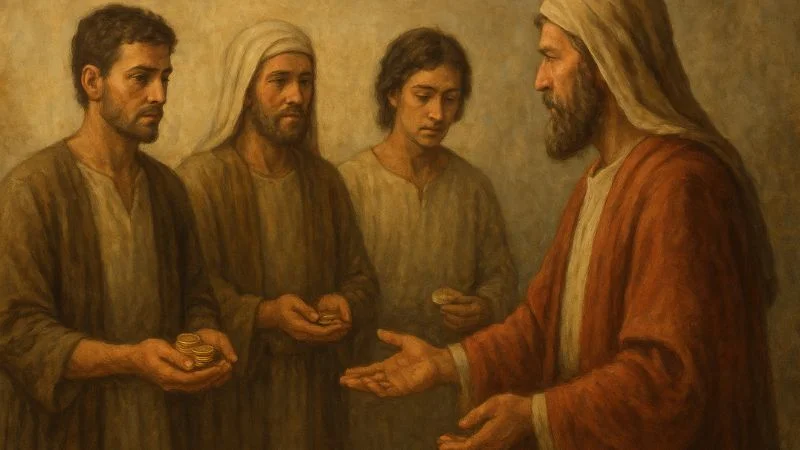
We all have seasons when life feels overwhelming. Responsibilities pile up. Opportunities come and go. And sometimes we wonder: Am I using what God has given me wisely?
Jesus’ Parable of the Talents (Matthew 25:14–30) speaks directly to these questions. Though He told it over 2,000 years ago, its lessons are just as relevant today. The story isn’t just about money. It’s about faithfulness in little things, stewardship, and using the gifts God entrusts to us.
A master gives his servants different amounts of talents: some a lot, some a little, and then goes away. When he returns, he asks them to account for what they’ve done. Some multiplied what they were given, and one buried it out of fear. The reward was based not on how much they started with, but on faithfulness, responsibility, and obedience.
In this post, we’ll explore five practical lessons from the Parable of the Talents and see how ordinary, everyday actions can honor God.
Understanding the Parable of the Talents

In Matthew 25:14-30, Jesus illustrates responsibility and faithfulness through a familiar scenario.
A master entrusts his servants with talents—large sums of money. Two servants invest their talents and double them. The master praises them: “Well done, good and faithful servant; you have been faithful over a little, I will set you over much” (Matthew 25:21, 23).
The third servant buries his talent out of fear. His inaction leads to loss and rebuke.
Key truths from this story:
- God entrusts each of us with something valuable, whether big or small.
- Faithfulness in the small things matters.
- Responsibility and action are rewarded; fear and inaction are not.
- Talents represent more than money; they include time, gifts, opportunities, and abilities.
Understanding the parable is the first step. The next is actively using what God has entrusted to you for His glory.
Lesson #1: God Entrusts Each of Us with Something Valuable
God gives each of us gifts, opportunities, and responsibilities tailored to our abilities (Matthew 25:15). The size of your “talent” doesn’t determine your worth; faithfulness does.
It’s easy to compare ourselves with others. You might see someone gifted in teaching, singing, or leadership and feel your contribution is small. But even small acts: using your skills at work, encouraging a friend, or serving in church matter.
Faithfulness in ordinary responsibilities is a form of worship.
Practical takeaway:
List your gifts, skills, and opportunities. Pray and ask God how He wants you to use them. Even small, intentional steps are meaningful.
Lesson #2: Faithfulness in Little Things Matters to God
Big achievements aren’t the only way to honor God. Jesus said, “Whoever can be trusted with very little can also be trusted with much” (Luke 16:10).
Faithfulness shows in everyday actions:
- Teaching a child about God’s Word
- Serving quietly in a ministry
- Using your skills with integrity, even when no one is watching
Every small act of obedience is a step in spiritual growth and Kingdom impact.
Practical takeaway:
Identify one small act of faithfulness to do this week. Even unseen efforts matter to God.
Lesson #3: God Expects Us to Use What He Gives, Not Hide It

The Parable of the Talents shows us a hard truth: God calls us to use what He entrusts to us, not bury it out of fear or hesitation. The third servant hid his talent, and his fear kept him from obeying. God calls each of us to step out in faith, even when we feel unqualified or unsure.
I can relate to that fear personally. When I first felt the desire to start my blog in 2017, I almost didn’t do it. I felt so unqualified. I hadn’t attended Bible school or completed a theology degree. I worried my voice wasn’t credible enough, especially as a woman writing about Scripture.
I shared my concerns with a churchmate—our music coordinator in the Middle East. He encouraged me to enroll in an online theology class or Bible school. Another churchmate, our assistant overseer, had already graduated from an online course, and I sometimes found myself envying him. But life and circumstances didn’t allow me to pursue formal training at that time.
Even with doubts and “what-ifs,” God kept nudging me: Use what I’ve already given you. Not someday. Not when everything is perfect. Now.
So, I started writing. One post at a time. One small step of obedience after another. And slowly, I learned that faithfulness matters more than credentials. God honors the effort and courage to act, not perfection.
Practical takeaway:
Identify one gift or opportunity you’ve hesitated to use. Ask Him for courage and take a small step this week. It could be sharing encouragement with a friend, volunteering, or using a hidden talent for His glory.
Lesson #4: Stewardship Is About Responsibility, Not Equal Results
God isn’t asking for equal results; He’s asking for faithfulness with what He’s given. The master rewarded the servants based on effort, not starting amounts (Matthew 25:21, 23).
Our responsibility is to use and grow what God entrusted to us. Even small, faithful steps matter. God values obedience over output and the heart behind the work over the size of the results.
Practical takeaway:
Ask God: How can I be faithful with what You’ve given me today? Serve in your capacity and trust Him with the outcome.
Lesson #5: Faithful Stewardship Brings Joy and Eternal Reward
One of the most encouraging parts of the Parable of the Talents is the promise of reward for faithfulness. The master said to the faithful servants, “Well done, good and faithful servant; you have been faithful over a little, I will set you over much” (Matthew 25:21, 23).
Faithful stewardship isn’t just about avoiding failure but experiencing joy in obedience and seeing God’s hand multiply our efforts.
This truth applies to everyday life. Even small acts such as helping a neighbor, mentoring, or serving quietly, honor God and contribute to His Kingdom.
Practical takeaway:
Reflect on one area where you’ve been faithful. Celebrate it. Trust God to multiply your efforts for His glory.
How to Use Your Gifts Faithfully for God’s Glory

Faithfulness isn’t about doing more than others; it’s about obedience, courage, and Kingdom impact.
1️⃣ Recognize what God has given you. Your gifts may feel small, but God can multiply them.
2️⃣ Step out in faith. Don’t wait until you feel “qualified.” Obedience begins with a single step.
3️⃣ Act consistently. Look for ways to serve, teach, or encourage in quiet, unseen ways.
4️⃣ Trust God with the outcome. Faithfulness matters more than perfection.
5️⃣ Reflect and adjust. Periodically ask God how you can grow in stewardship.
Conclusion: Faithfulness Matters More Than Size
God doesn’t measure us by what we start with. He measures faithfulness, obedience, and courage to act.
Even small acts: praying, teaching, encouraging, or sharing God’s Word, have eternal impact. What matters is not the size of your talent, but the faithfulness of your heart.
Key Takeaway:
- God entrusts each of us with unique gifts and opportunities.
- Faithfulness in little things matters greatly.
- Avoid hiding what God has given you.
- Focus on responsibility, not comparison.
- Your obedience brings joy and eternal reward.
Take courage today. Reflect on your gifts, step out in faith, and trust God to multiply your efforts for His Kingdom.

What stood out to me right away was how thoughtfully you unpacked the Parable of the Talents and tied faithfulness, stewardship, and personal responsibility together in a way that feels both biblical and practical.
I do find myself wondering, though: how do you personally discern the difference between using God-given gifts faithfully and falling into fear or comparison when results look different from others? That reflection could really invite deeper conversation in the comments.
Overall, it’s a meaningful, well-grounded piece that encourages readers to reflect on how they’re showing up with what they’ve been given.
Thank you so much, Lori Lynn. That’s a thoughtful question.
For me, the difference comes down to obedience rather than outcomes. When I focus on prayerfully using what God has given me, without constantly comparing myself to others, I find peace, even if the results seem small.
Fear and comparison tend to arise when I shift my focus from being faithful to seeking visibility or approval.
I appreciate you bringing this up; it’s an important tension that many of us face.
What a beautiful and profound reflection on the Parable of the Talents! This isn’t just an economic lesson; it is absolutely a spiritual blueprint for living out our faith.
As someone whose relationship with God is my priority, this parable always challenges me to examine my own life and how I’m using the resources He has so graciously provided.
Hi Leah, thank you so much for your comment.
I appreciate how you highlighted that this is a spiritual blueprint rather than just an economic one. It’s so easy to get caught up in the ‘numbers,’ but the heart of the parable is really about the faithfulness of the servant and the character of the Master.
It’s a beautiful (and sometimes challenging!) opportunity to view our resources through the lens of our relationship with Him. When He is our priority, stewardship transforms from a chore into an act of worship.
Blessings!
Alice